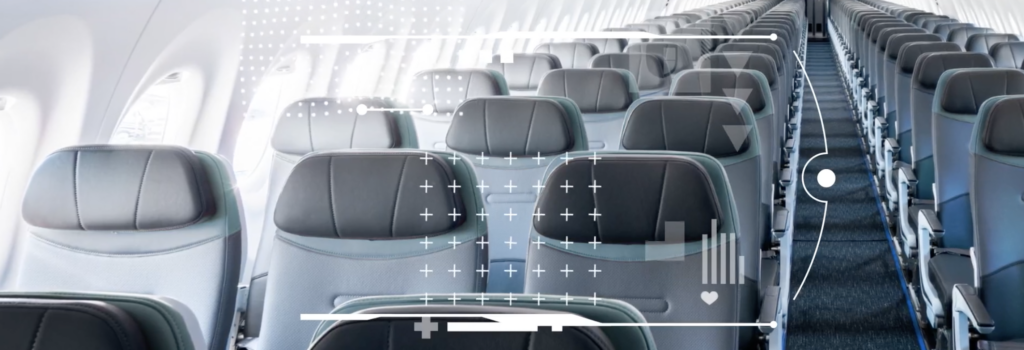
Collins Aerospace is nominated for three Crystal Cabin Awards recognizing its InteliSence cabin experience, Pothos cabin air ionizer, and Q-Tech. (Photo: Collins Aerospace)
Collins Aerospace, one of the world’s largest aerospace and defense companies, was named as a finalist for three Crystal Cabin Awards this week. This recognition is given to companies that use innovation and improved technology to develop outstanding improvements in aircraft interiors and passenger experience. Collins was recognized for its InteliSence cabin experience, Pothos cabin air ionizer, and Q-Tech.
The Crystal Cabin Awards recognize outstanding innovations in eight different categories pertaining to aircraft interiors and passenger experience: cabin concepts, cabin systems, health and safety, IFEC and digital services, material and components, passenger comfort, sustainable cabins, and universities. Collins was recognized in the categories of passenger comfort (InteliSence), health and safety (Pothos), and cabin systems (Q-Tech).
InteliSence aims to modernize the onboard experience through the use of sensors and AI technology. These two systems track passenger interactions with various objects within an aircraft suite. This includes items involved with in-flight service like glasses and plates along with passenger’s personal items like cell phones and other electronic devices. This information is then shared with cabin crew, who can then use the information to offer more attentive service by proactively offering things like refills and converting seats to lie-flat beds.

The InteliSence intelligent cabin experience improves operational management. Using the technology, airlines are better able to optimize power usage and enable proactive maintenance. (Photo: Collins Aerospace)
Collins also aims to improve the air quality on commercial aircraft through the introduction of Pothos, a cabin air ionizer. This product deodorizes aircraft cabins by targeting areas more prone to odor because of more air recirculation. Collins claims Pothos can mimic the air quality of pristine outdoor conditions, and points to the system’s compact and lightweight design along with its easy integration with existing aircraft designs as its major selling points.
Collins’ innovative Q-Tech, another Crystal Cabin finalist, uses alternative materials to reduce sound in aircraft cabins. A sound-absorbing “metamaterial,” it can be placed in a variety of strategic locations within the cabin to mitigate certain noises. Galley equipment, seats and even headrests can be outfitted with this new material, which has shown to be 10x more effective in absorbing sound when compared to existing wall panels.
This is not the first time Collins was recognized for innovations in passenger experience. The company has earned 12 Crystal Cabin Awards total. This includes last year, when the company’s thermoelectric cooling system SpaceChiller was awarded the first place prize in the passenger comfort category for its ability to efficiently chill aircraft compartments to a temperature safe for food without the use of refrigerants.
This year’s Crystal Cabin Award winners will be announced on June 6, 2023, at the Aircraft Interiors Expo in Hamburg, Germany. Along with Collins Aerospace’s InteliSence technology, innovations from both Adient Aerospace and Airbus were nominated in the passenger comfort category. Adient Aerospace, in partnership with Boeing EnCore Interiors, began offering a new configuration called the Ascent Front Row Suite that includes a desk, minibar, library, bed, and room for a companion. Airbus has been nominated for its A350 Airspace Cabin that incorporates a new rest compartment for the flight crew as well as larger galleys.